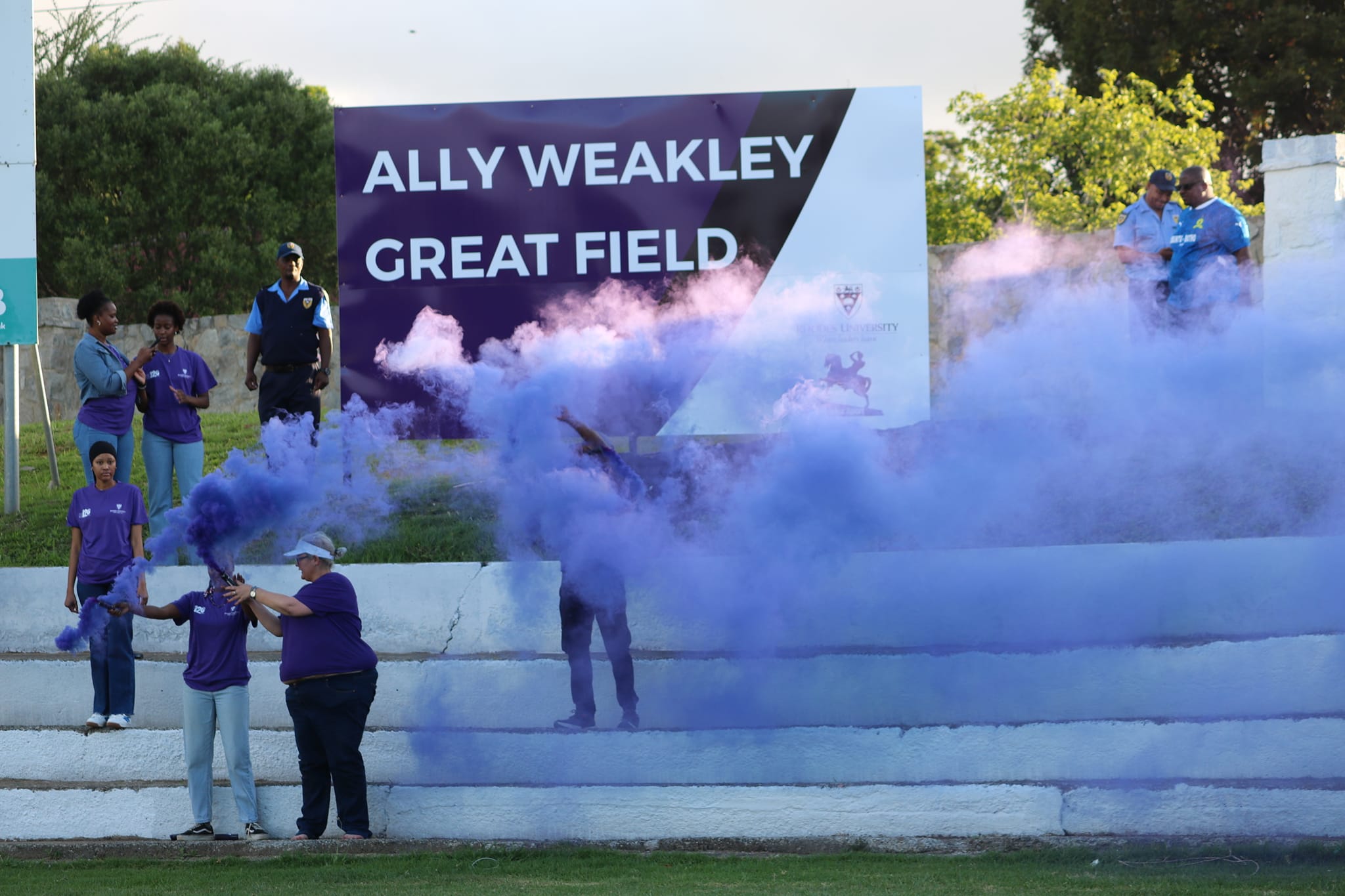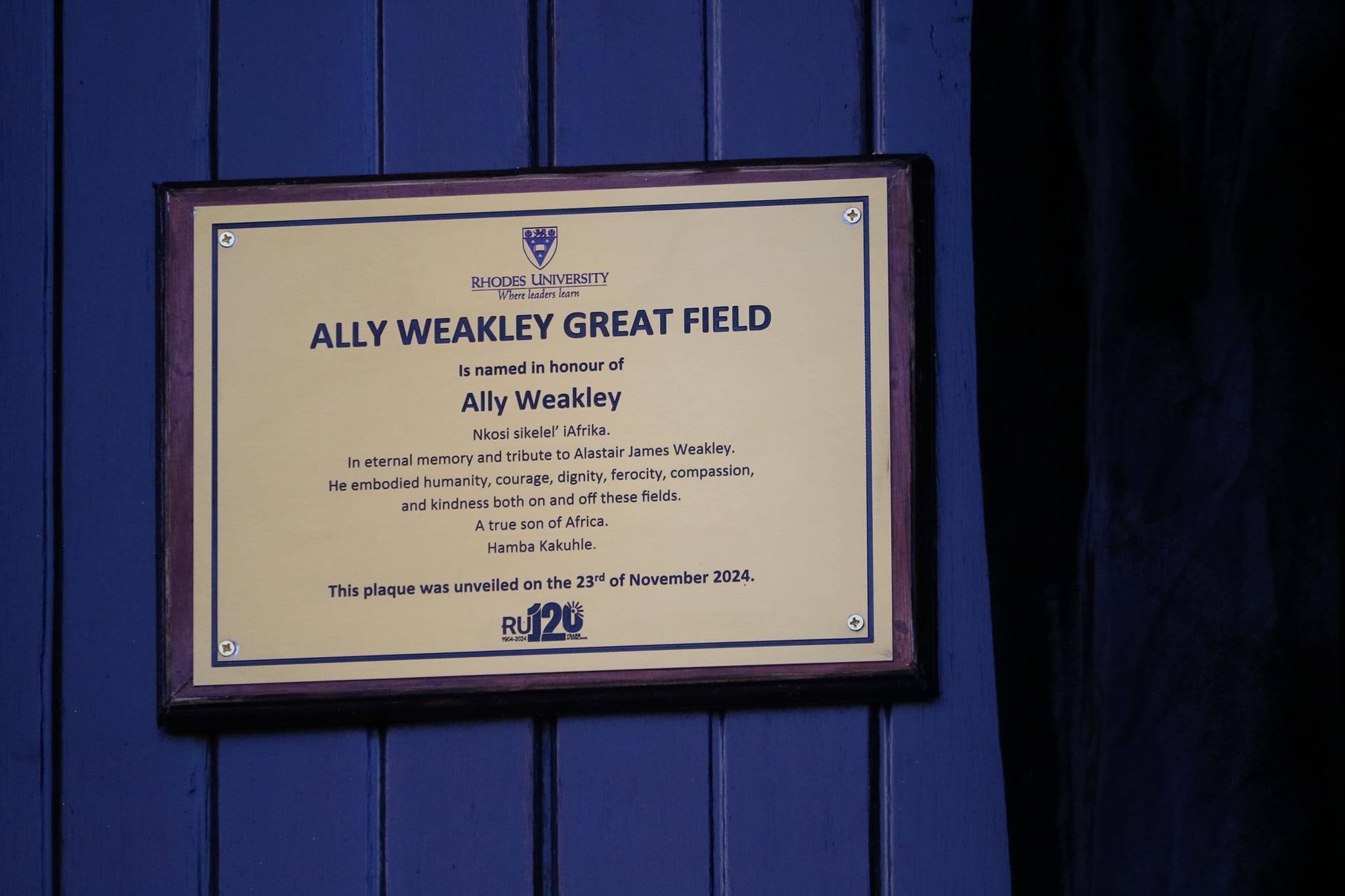
By Siyamthanda Hobo
Rhodes University honoured one of its most esteemed alumni, Ally Weakley, by naming its iconic Great Field after him on the 23rd of November 2024. The Ally Weakley Great Field was unveiled during a moving ceremony as part of the University’s 120th-anniversary celebrations. The event celebrated Weakley’s enduring legacy as a sportsman, anti-Apartheid activist, and advocate for justice.
The ceremony commenced with a warm welcome from Sue Smailes, Director of the Office of the Vice-Chancellor and the Rhodes University Sports Council Chair. Smailes highlighted Weakley’s transformative contributions to the University and South Africa’s social and sporting landscapes.
“Ally embodied courage, empathy, and kindness,” Smailes remarked. “This field, which witnessed his countless acts of determination and passion, now stands as a symbol of the values he held dear—unity, resilience, and justice.”
Distinguished guests included Weakley’s sisters, Ros Stratford and Joan Twentyman, who had travelled from Australia and Gqeberha, respectively, to pay tribute to their late brother.
Professor Sizwe Mabizela, Vice-Chancellor of Rhodes University, delivered a heartfelt address before unveiling the commemorative plaque. In his remarks, Mabizela reflected on the lessons to be drawn from Weakley’s life.
“Ally could have chosen the path of comfort,” Mabizela said. “He could have accepted the privileges afforded by an unjust system. Instead, he chose courage. He chose to fight for equality and justice, building bridges across the divides of our society. His legacy is a call to action for all of us.”
Mabizela urged the audience to honour Weakley’s memory by embodying his values. “The most fitting tribute we can give Ally is to live out the ideals he championed—justice, compassion, and equity. Let this field remind us daily of our shared humanity and the need to uplift one another.”

One of Weakley’s most notable contributions was his role in South Africa’s first mixed-race rugby match in 1976. He and his Rhodes teammates defied Apartheid-era laws and policies to participate in this groundbreaking game, which challenged the norms of segregation in sports.
Professor Steve Olivier, a close friend and collaborator, spoke at length about Weakley’s leadership during this historic event:
“Ally believed in the power of sport to unite people,” Olivier said. “When others stepped back, he stepped forward. That match was more than just a game; it was a statement against injustice. Over 10,000 people came to watch, and Ally led us with unwavering determination. He was fearless, not just on the field but in life.”
The mixed-race match earned international attention and marked a turning point in South African sport and the anti-Apartheid movement.
During his speech, Professor Olivier recounted the momentous occasion. “We were warned that playing in the match could lead to suspension or even arrest,” he said. “But Ally stood firm. ‘It’s the game that matters,’ he had said, and we played. Over 10,000 people came to watch that game. The cheers and unity were moments none of us will ever forget.” The match, which saw the Rhodes team lose 18-3 to Kwazakele Rugby Union, catalysed change in South African sport. “That day, we didn’t just play rugby,” said Olivier. “We challenged the status quo. Ally led us with unwavering determination and inspired all who stood with him.”
Professor Olivier, who has been instrumental in establishing the Ally Weakley Memorial Bursary, spoke warmly of his friend’s indomitable spirit. “Ally had a way of drawing people in,” he said. “It was his presence, kindness, and unwavering commitment to justice. He wasn’t perfect—he had flaws like anyone else—but he was deeply respected and loved.”
The bursary, now totalling over R2.5 million, reflects Weakley’s dedication to providing opportunities for others. “This isn’t just about naming a field,” Olivier emphasised. “It’s about building a legacy of inclusivity, education, and opportunity. It’s about giving back to a community that Ally held so dear.”
The mixed-race match earned international attention and marked a turning point in South African sport and the broader anti-apartheid movement.
Weakley’s sisters shared personal stories and heartfelt reflections on their brother’s legacy during the ceremony.
“Ally believed deeply in humanity,” said Ros Stratford. “What was said today about his vision for an inclusive society is true. He always sought to bring people together, and he never let barriers divide him from others. I’m so proud to see his name on this field.”
Joan Twentyman echoed her sister’s sentiments: “Ally was ahead of his time. His vision for this country was one of unity and equality. He believed that no matter the colour of our skin, we are all human beings deserving of respect. Seeing him honoured like this is incredibly moving for our family.”
The celebrations continued with a formal dinner at the Nelson Mandela Dining Hall, where friends, family, and alumni reflected on Weakley’s remarkable life.
Justice Lex Mpati, Chancellor of Rhodes University, shared his reflections during the dinner. As a former teammate of Weakley’s, Judge Mpati recounted their time on the rugby field and the lessons learned from Ally’s leadership.
“Ally was a natural leader,” Judge Mpati said. “He wasn’t the biggest man on the field, but his courage, determination, and belief in his teammates made him a giant. His story reminds us that sport is more than a game— a force for change.”
Professor Mabokang Monnapula-Mapesela, Deputy Vice-Chancellor for Academic and Student Affairs, delivered the vote of thanks, expressing gratitude to everyone who contributed to the day’s success.

